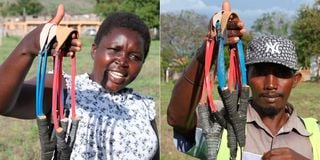
Elizabeth Nthemba (left) and her husband Bernard Musa displays their homemade catapults at Sultan Hamud on November 22, 2024.
In the case of a countryside item stretching into the hustle and bustle of urban areas, catapults are becoming a common feature among products being sold in Nairobi and its environs.
Hawkers will be seen dangling the tool on various roads, and we also found a shop in Nairobi selling an imported type with a plastic base that promises laser-assisted accuracy.
Conversations with sellers revealed that the item made of rubber and leather, which can be used to hurl a projectile at a high speed, is popular among people who own farms that get raided by birds, long-distance drivers and security personnel.
It is a hot, dusty Wednesday afternoon in Kitengela, just a few days to Christmas. On the Nairobi-Namanga road, a short distance past Kitengela, Peter James is carrying at least 15 catapults, alongside a bunch of about six fly whisks. He is targeting those driving in the Nairobi direction.
He has two types of catapults: one with blue rubber and another with a red one. The blue one goes for Sh200 while the red one costs Sh300.
He says he makes them himself at his home in Ukambani. A tree in his homeland, he says, produces the best Y-shaped bases that he uses to make the items. The red or blue rubber, he notes, is bought from neighbouring Tanzania.
“We sell to people who own farms, also to watchmen,” says the youthful man.
On the same afternoon in Hurlingham, Nairobi, we step into an online shopping business called Sophie’s. We are here because we stumbled upon an online advertisement for imported catapults. It is described as an outdoor hunting sports slingshot.
The attendant informs us that the item costs Sh1,479 for the whole unit.
“It’s a global product,” he adds.
Elsewhere, in the Sultan Hamud Township on Mombasa Road, we find a couple that hawks catapults.
Bernard Musau, 35, and his wife Elizabeth Nthemba, 30, are risking it all to sell the item to motorists. They prefer standing in the middle of the road to enhance their chances of reaching out to motorists on both lanes.
“When almost everyone retreats to the farmlands after the onset of the rainy season, we remain here. Assembling and selling catapults has been my only source of income for the last 10 years. I take it seriously,”says Bernard.
His wife, with whom they have three children, joined him only recently. She used to sell fruits at Sultan Hamud.
“The catapult business is lucrative. Unlike fruits, catapults do not go bad after some time. Therefore, the chances of incurring losses are minimal,” she tells the Nation.
The two agree that the toughest part of the catapult business is dodging speeding vehicles. It is not uncommon for a hawker to be run over by a vehicle.
“Hawking catapults on the busy highway is risky. We are always on the lookout for reckless motorists. We are particularly afraid of the drivers who overtake blindly. To be safe, we prefer operating near bumps and rumble strips. This has, however, not insulated us from accidents. A speeding truck killed a colleague earlier this year,” says Elizabeth.
Sultan Hamud Township, which is named after Sultan Ali Hamud who ruled Zanzibar from 1902 to 1911, is popular among travellers with an interest in history.
It is increasingly gaining the reputation of being a hub of homemade catapults.
Every day, tens of young men spend hours assembling catapults in makeshift stalls dotting the busy township.
Assembling a catapult mainly entails tying two rubber bands on a Y-shaped wooden stick on one end and a piece of leather for holding the small stone at the other end using rubber strips.
At Sultan Hamud, a catapult goes for between Sh100 and Sh200. According to Bernard, a hawker can sell up to 100 pieces in a day. A catapult earns a hawker Sh20 in commission, making it the most lucrative among the commodities preferred by hawkers in the town.
To be on the safe side, many of the hawkers combine catapults with either bottled water or energy drinks.
“On a good day, I make up to Sh800 in commission. This is more than enough for my daily upkeep and rent,” says Kelvin Musyoka, a bachelor who joined the catapults industry two years ago.

Kelvin Musyoka hawks home-made catapults at Sultan Hamud Township in Makueni County on November 22, 2024.
Just like Bernard, the 26-year-old Kevin initially worked as a farmhand in the countryside before moving to the busy township.
At the heart of the thriving catapult enterprise is global trade.
Traders based in Mombasa and Nairobi import sheets of rubber which they slice into rubber strips that go into making catapults.
John Kiilu, one of the traders, says the sheets of rubber are primarily used as pallets by shipping lines ferrying containers across the world.
“We slice the sheets of rubber into strips using a special machine and sell them to those who make catapults across the country,” he says.
According to Mutuku Muindi, a cultural enthusiast who runs a vibrant Kamba cultural museum near Sultan Hamud, catapults are an addition to the community’s arsenal.
“Elastic catapults emerged at the advent of rubber. They are popular with boys learning the ropes of hunting and night guards who use them to scare intruders,” he says.
Motorists plying the busy highway are the biggest market for catapults in the Sultan Hamud Township.
The traders also supply to established retailers who distribute to other markets.
Over time, the hawkers have established that many of the catapults go into enhancing farm yields by scaring quelea birds that attack sorghum fields.
“Most of our repeat clients are commercial farmers who buy catapults for their farm workers. They are also used to scare monkeys which attack maize. Also, some customers use them as weapons for personal protection,” says Bernard.






